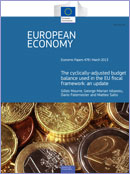|
|
|
|
|
|
 |
 |
 |
 |
Strengthening economic policy coordination and integration in the euro area: Commission proposes additional concrete steps
The European Commission presented two new Communications on 20 March aimed at further strengthening economic policy coordination and integration in the euro area. The two Communications propose the next steps towards a deep and genuine Economic and Monetary Union (EMU). The Communication on the ex-ante coordination of plans for major economic policy reforms proposes that such reforms be assessed and discussed at the EU level before final decisions are taken at the national level. The intention is to properly take into account any positive or negative economic spillover effects that could impact the economic performance of other euro area countries. The Communication on a Convergence and Competitiveness Instrument (CCI) aims to help Member States facing difficulties undertake reforms that are necessary for growth and competitiveness and which contribute to a smoothly functioning EMU. It would combine “contractual arrangements” with a solidarity mechanism of financing that contributes to the cost of addressing any potential negative impact from the reforms.
|
 |
 |
 |
|
 |
 |
 |
 |
 |
|
 |
 |
 |
With these two Communications, the Commission is building on the major steps forward taken in budgetary policy coordination, by enhancing the framework for better coordinated structural reforms. Our aim is very clear: to help Member States design, decide and implement better, earlier and faster reforms for growth, competitiveness and job creation.
Olli Rehn, Commission Vice-President for Economic and Monetary Affairs and the Euro. |
 |
|
|
|
 |
 |
 |
 |
Quarterly Report on the Euro Area assesses growth convergence following introduction of the euro
The first 2013 edition, published on 27 March, assesses in its focus section the growth convergence of euro area Member States following the introduction of the euro, which was comparatively weak due to disappointing productivity developments and capital misallocation. A special topic looks at explanations for the divergence in bank lending rates across the euro area. A further section examines the ongoing balance sheet adjustment processes in the non-financial sector of the euro area, with a focus on underlying supply and demand conditions and their policy implications. A final section looks at the growth impact of fiscal consolidation in times of close linkages between sovereign risk premia and banks’ balance sheets, finding that the pursuit of credible front-loaded consolidation strategies can be preferable in terms of short-term growth benefits.
|
 |
|
 |
 |
|
 |
 |
 |
 |
EU Justice Scoreboard to promote more effective justice systems that facilitate economic growth
The European Commission has unveiled a new comparative tool to promote effective justice systems in the EU and thereby reinforce economic growth. The ‘European Justice Scoreboard’, which was launched on 27 March, will provide objective, reliable and comparable data on the functioning of the justice systems in the EU’s 27 Member States. Vice President Ollie Rehn said that the "quality, independence and efficiency of the justice systems are essential to growth and social stability in all Member States". As national courts play an essential role in upholding EU law, shortcomings in national justice systems can affect the functioning of the EU’s Single Market. The 2013 Justice Scoreboard focuses on the parameters of a justice system – such as efficiency indicators for civil and commercial cases and administrative courts – which contribute to the improvement of the business and investment climate. The issues identified in this year’s scoreboard will be taken into account in preparing the country specific analyses within the European Semester process.
|
 |
|
 |
 |
|
 |
 |
 |
 |
Eurogroup and Cyprus agree on terms of adjustment programme
The Eurogroup reached agreement on 25 March with the Cypriot authorities on the key elements of a future macroeconomic adjustment programme. The agreement is supported by all euro area Member States, as well as the European Commission, the European Central Bank (ECB) and the International Monetary Fund (IMF). The programme includes plans for restructuring the financial sector and would safeguard all deposits below EUR 100,000 in accordance with EU principles. In addition, the Cypriot authorities have reaffirmed their commitment to step up efforts in the areas of fiscal consolidation, structural reforms and privatisation. Formal approval of an agreement by the European Stability Mechanism (ESM) Board of Governors is expected by the third week of April. During the Eurogroup press conference, Vice President Olli Rehn announced the formation of a Commission Task Force that will provide technical assistance to the Cypriot authorities, with a strong focus on employment, competitiveness and growth.
|
 |
|
 |
 |
|
 |
 |
 |
 |
Commission launches Green Paper on the long-term financing of the European economy
The European Commission adopted a Green Paper on 25 March that launches a three-month public consultation on how to foster the supply of long-term financing and how to improve and diversify the system of financial intermediation for long-term investment in Europe. Long-term investment enhances the productive capacity of the economy and supports sustainable growth. Yet the financial crisis has affected the ability of the financial sector in Europe to channel savings to long-term investment. Thus, it is essential to find ways to improve the availability of long-term financing and the Green Paper focuses on how that process operates. It will focus on questions such as whether Europe’s historically heavy dependence on banks to finance long-term investment will and should give way to a more diversified system, and the financing needs of small and medium-sized enterprises (SMEs).
|
 |
|
 |
 |
|
 |
 |
 |
 |
Portugal review mission finds economic adjustment programme on track
Staff teams from the European Commission (EC), European Central Bank (ECB), and International Monetary Fund (IMF) visited Lisbon during 25 February-14 March for the seventh quarterly review of Portugal’s economic adjustment programme. They found that programme implementation remains broadly on track. The end-2012 fiscal deficit target was met, financial sector stability has been safeguarded, and a wide range of structural reforms is progressing. External adjustment continued to exceed expectations. Moreover, the government has resumed issuance in the bond market, while domestic financing conditions have eased somewhat. At the same time, weakening export demand, low confidence, and the private sector debt overhang mean that the recession will be deeper than expected. Nonetheless, a recovery is still expected late in the year, and an expansion of 0.6% in 2014. The conclusion of the current review could take place in May, and will allow the disbursement of EUR 2.0 billion (EUR 1.3 billion by the EU, and about EUR 0.7 billion by the IMF)
|
 |
|
 |
 |
|
|
|
 |
 |
 |
 |
The cyclically-adjusted budget balance used in the EU fiscal framework: an update. European Economy. Economic Paper 478. March 2013. Brussels.
This paper reviews and explains in detail recent improvements to the cyclically-adjusted budget balance (CAB), and describes their impact on CAB results. The CAB is the backbone of the EU framework for fiscal surveillance, both in its preventive and corrective arms. The concept corresponds to the budget balance prevailing if the economy was running at potential. After correcting for one-off and temporary measures, it is called the structural budget balance and used to assess the fiscal policy stance. The CAB was improved to better measure the reaction of the balance-to-GDP ratio to cyclical conditions. This was achieved by using a more precise concept of the cyclical-adjustment parameter and by updating the decade-old fiscal elasticities underlying the computation of the CAB.
|
|
 |
 |
|
|
|
|
|
|
|
|
|
|
|
|
|
|
|
 |
| Directorate-General for Economic and Financial Affairs |
 |